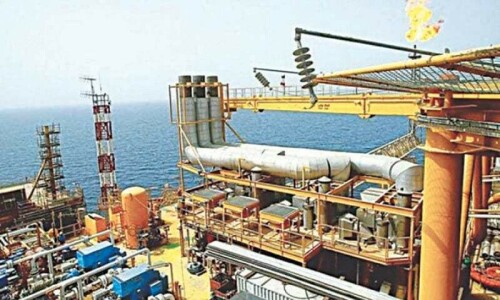
ISLAMABAD: Pakistan on Thursday made it clear that the China-Pakistan Economic Corridor (CPEC) had no military dimensions.
Foreign Office spokesman Dr Mohammad Faisal, during his last weekly press briefing of the current calendar year, had been asked to comment on a report published in a section of US media alleging that the CPEC was not only about economy and trade but had military dimensions as well.
Mr Faisal said the CPEC was an economic project between Pakistan and China. “The CPEC has helped Pakistan improve its economy, particularly energy and infrastructure sectors have improved under it. The CPEC is a bilateral economic project, which is not against any country,” he said.
Answering a question, he said the recent four-nation visit of the foreign minister was essentially part of the government policy to strengthen relations with all neighbours and regional countries and added that as part of the same effort the foreign minister would soon visit Qatar.
It is economic project which is not against any country: FO
The spokesman said Pakistan’s long-standing position to give peace and reconciliation a real chance in Afghanistan had become the basis of an international consensus.
“Recent developments in Afghanistan have all led to this widely acknowledged agreement. This new opening in Afghanistan and willingness of all countries who agree on Pakistan’s important role as facilitator has provided us a significant opportunity to also strengthen our bilateral relations with all the neighbours, especially for promotion of trade, economic and people-to- people linkages,” he said.
“The visit also provided an opportunity to listen to views of the leadership of these countries for promoting a joint regional approach towards Afghanistan and explore realistic possibilities of regional integration in economic terms,” he said.
Responding to another question, he said 341 Pakistani prisoners — 154 of them civilians and 187 fishermen — were currently incarcerated in Indian jails. Of them 45 prisoners, 12 civilians and 33 fishermen, have completed their sentence.
“Our mission is in contact with India’s external affairs ministry and related state governments for repatriation of Pakistani prisoners. The Pakistani high commission also engages with the Indian media to highlight the plight of Pakistani prisoners. A law firm has also been hired to assist in and facilitate the repatriation. Where required, NGOs working for prisoners and civil rights activists have also been engaged to facilitate repatriation of Pakistani prisoners.”
The spokesman said there were some problems in getting consular access, adding “however, our mission perseveres and actively pursues issues of all such prisoners.”
About reports of harassment by Indian authorities of Pakistani diplomats posted in New Delhi, and similar allegations from the other side, he said Pakistan stood for upholding the Vienna Convention on Diplomatic Relations and had always endeavoured to facilitate the working of the Indian high commission in Islamabad, within the diplomatic norms, international law and practice. “It remains our position that the smooth and unhindered functioning of diplomatic missions is essential,” he remarked.
The Foreign Office spokesman urged the international community, especially human rights champions, to persuade India to immediately halt human rights violations and atrocities in held Kashmir. He said Indian occupation forces, during the so-called search and cordon operations, had recently martyred six Kashmiris — Soliha Mohammad Akhoon, Rasik Mir, Rouf Mir, Umer Ramzan Mir, Nadeem Sofi and Faisal Javid Khan — in Pulwama district of the occupied territory.
He refused to comment on appointment of two former Afghan intelligence chiefs known for their anti-Pakistan stance as interior and defence ministers by Afghan President Ashraf Ghani.
He also refused to comment on President Donald Trump’s surprise trip to Iraq to visit US forces stationed there that was condemned both by Iraqi politicians and militia leaders, and cancellation of his meeting with the Iraqi prime minister due to disagreement over the venue, saying “we cannot comment on the relations between two sovereign nations”.
Asked to confirm the reports that the second round of talks between United States and Taliban would take place in Saudi Arabia, he said “No. I have nothing more to say on this issue”.
Published in Dawn, December 28th, 2018












































